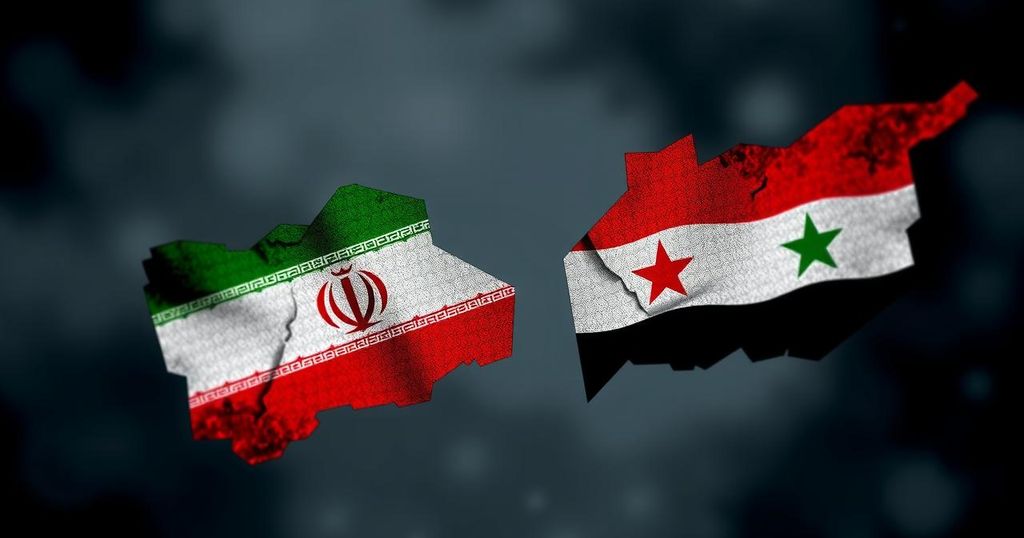Global news
ABBAS ARAGHCHI, AL - SABBAGH, ASIA, ASTANA, BASSAM AL - SABBAGH, DAMASCUS, DIPLOMACY, EUROPE, EUROPE/ASIA, FOREIGN POLICY, GAZA, GAZA STRIP, GOLAN, HEZBOLLAH, IRAN, ISRAEL, KAZAKHSTAN, LEBANON, MIDDLE EAST, MOSCOW, NORTH AMERICA, PALESTINE, RUSSIA, SANCTIONS, SYRIA, SYRIAN CONFLICT, TEHRAN, TRUMP, TURKEY, UKRAINE, UNITED STATES, US
Isaac Bennett
0 Comments
Iran and Syria Strengthen Ties Amid Regional Challenges
Syrian Foreign Minister Bassam al-Sabbagh’s recent visit to Iran demonstrated the strengthening of ties between Iran and Syria amidst regional tensions. Both nations discussed mutual concerns, including the conflict in Gaza and Israeli actions, as they prepare for potential geopolitical shifts due to an incoming US administration and Russian activities. The situation remains dynamic, pressing both countries to enhance their collaborative strategy.
This week, Syrian Foreign Minister Bassam al-Sabbagh visited Iran for discussions with his Iranian counterpart, Foreign Minister Abbas Araghchi. While Iranian state media did not disclose extensive details on their conversations, it was made clear that they reaffirmed Iran’s ongoing support for the Syrian regime. As the geopolitical landscape shifts, both nations seem to be strategizing their future, particularly in light of an incoming US administration and potential escalations involving Russia in Ukraine, which could impact their alliance. It is significant to note that Iran’s backing is crucial for Syria, especially as both countries navigate a series of regional tensions. Russia, a powerful ally of Syria, has also been engaged in discussions with Turkey regarding Syrian normalization, which could complicate Iran’s position. Both Iranian and Syrian foreign ministers recently embarked on their respective roles, which might contribute to fresh perspectives on their collaborative strategy moving forward. During their meeting, Araghchi stressed the importance of enhancing cooperation between Iran and Syria, emphasizing common regional issues. Topics included the situations in Gaza and Lebanon, highlighting Syria’s role in facilitating Iranian support for Hezbollah. Moreover, recent tensions along the Golan border, particularly regarding Israel’s activities, have provoked ire from Iran, with condemnation of what they perceive as provocations from Israel and reaffirmation of their defensive posture. As Iran braces for renewed maximum pressure tactics from the incoming US administration, the foreign minister declared that such pressures would fail and reiterated Syria’s stance against Israeli actions across regional borders. Additionally, Iran condemned sanctions imposed by the EU and UK, indicating their readiness to resist external pressures while alert to developing circumstances in the region. Interestingly, Iran’s foreign policy seems to advocate for a philosophy of engaging in military preparation as a pathway to peace, suggesting a potential shift in rhetoric regarding Israel. In conjunction with these developments, reports indicate that Israel has proposed lifting certain sanctions on the Syrian President in exchange for his cooperation in regulating arms flow to Hezbollah, signifying complex negotiations at play within the broader geopolitical framework. Overall, Iran and Syria are evidently committed to reinforcing their alliance amid multifaceted regional challenges, while also assessing shifting dynamics involving key players like the United States and Russia, alongside the ongoing Turkish influence in the Middle East. This alliance remains critical for both nations as they respond to evolving threats and opportunities.
The relationship between Iran and Syria has been historically significant, especially since Syria serves as a conduit for Iranian military support to Hezbollah. Tensions in the region have escalated due to various factors like the ongoing Israeli-Palestinian conflict, as well as U.S. foreign policy changes that impact both nations. With the changing administrations in the U.S. and the presence of Russia, which has played a supportive role in Syria against common adversaries, both Iran and Syria are compelled to reassess their strategic ties. Furthermore, the dynamics with Turkey and the role of groups like Hamas create further complexity in regional politics, necessitating reinforced alliances between Iran and Syria.
In summary, the recent meeting between Iranian and Syrian foreign ministers signifies a strong reaffirmation of their strategic alliance. As they face new challenges on multiple fronts, including US sanctions and regional tensions with Israel, both nations are likely to enhance their cooperation. The political climate in the region remains volatile, especially with regard to Russian involvement and potential shifts in relations with Turkey, making the Iran-Syria alliance increasingly crucial in this evolving landscape.
Original Source: www.jpost.com




Post Comment